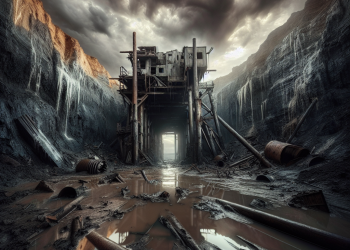The federal government has decided to pull out of the proposed Lagos-Calabar Coastal Road realignment.
However, this is after some of the sections of Landmark Beach had been demolished for the supposed project.
The Minister of Works, Dave Umahi, made this disclosure during the 3rd Stakeholders Meeting in Lagos on Thursday that the planned rerouting of the Lagos-Calabar Highway will not proceed as initially intended.
This decision was made in consideration of the presence of submarine cables along the coastline. As a result, the Lagos-Calabar Coastal Road will now revert to its original route for a stretch of 9 kilometers, veering away from the shoreline.
Umahi, while addressing stakeholders at the meeting on the coastal road project informed community groups and traditional institutions in the state, particularly the Okun-Ajah community in Lagos.
Earlier, the Okun-Ajah community cried out and warned the federal and Lagos State governments over the alleged illegal variation to the Lagos-Calabar coastal highway route which put six villages at risk of demolition and also the displacement of three traditional kings within the Community if the plan was not shelved.
The minister emphasized the importance of redesigning the route to preserve the 600-year-old heritage of the Okun-Ajah community. He mentioned that the president, in a display of compassion to support the project, included a human element to protect the property and infrastructure of the Okun-Ajah area.
Umahi emphasized that the confiscation of properties along the route adheres to the principles of the legal system and clarified that only individuals who possess verified property titles will be eligible for compensation.
He also commended the president for adjusting the alignment routes to safeguard the communities affected by the demolition activities that are impacting the indigenous populations in the state.
Umahi concluded by saying;
“To the glory of God, to solve MTN, 2Africa, and Okun Ajah community (complaints), we are diverting completely from the new alignment and we are rejoining back to our new alignment at kilometer 25. Congratulations.”
Umahi also announced that the Environmental Impact Assessment (EIA) would not be available for now, citing Section 15 (b) of the Freedom of Information Act to support the government’s decision to withhold certain information from the press and public.
More Insights
What To Know
The announcement comes after the telecommunication companies warned the government of the possibility of network outage in the country if the diversion is not reconsidered.
The government has since decided not to proceed with the diversion, which would affect connectivity to the internet in the country and lead to the demolition of ancestral homes in the Okun-Ajah community.
In a video posted by journalist Laila Johnson-Salami, members of the Okun-Ajah community were seen praising the Tinubu-led administration for its decision not to use the route.
Backstory
The Hitech Construction Company Limited was granted the contract for the Lagos-Calabar coastal highway project, which is planned to cover a distance of 700 kilometers and traverse nine states. This project follows an Engineering, Procurement, Construction, and Financing (EPC+F) arrangement, wherein the contractor assumes the majority of the risk, while the federal government offers counterpart funding.
The Federal Government commenced the construction in March 2024, beginning with the first phase of the project, which stretches 47.47 kilometres from Lagos.
Following public outcry, especially from politicians like Atiku Abubakar, who claimed the project was not intended for completion since it starts from Lagos and not Calabar in Cross River State, Minister of Works, David Umahi clarified that subsequent sections will begin in other states along the route.










